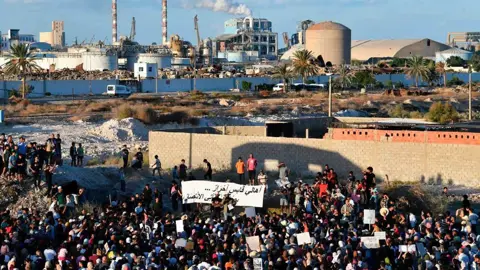Protests Erupt in Gabes Over Industrial Pollution and Health Concerns

Gabes, located in southeastern Tunisia, is experiencing heightened tensions due to recent incidents of asphyxiation and paralysis among residents, attributed to the local chemical complex.
Hundreds of protesters gathered outside the Gabes courthouse in support of a lawsuit demanding the closure of polluting industrial units. Demonstrators called for an end to what they describe as an "environmental catastrophe" and the dismantling of a phosphate treatment plant, which has been accused for decades of causing severe health issues and environmental degradation in the region's air and marine ecosystems.
During a session intended to consider suspending operations at the complex, which was postponed, attorney Munir Adouni, representing the plaintiffs, presented evidence to the court that he claims demonstrates a "crime against the city." The case is scheduled for further examination on November 20.
This surge in activism follows the circulation of videos showing students being transported in critical condition after suffering from asphyxiation at their schools. Local authorities reported 22 new cases of asphyxiation at Shatt al-Salam school on Wednesday, along with three additional cases at another institution, accompanied by symptoms such as difficulty walking, numbness, and partial paralysis, igniting widespread outrage among residents.
Local inhabitants describe the operations of the complex, which began in 1972, as a "continuing environmental crime" linked to rising cancer rates and respiratory and bone disorders. Environmental reports indicate emissions of harmful gases and the discharge of phosphogypsum waste into the sea, laden with heavy metals.
In response to growing public pressure, the Minister of Environment announced a plan to clean 9,000 hectares of the seabed in Gabes Bay, while the Minister of Equipment pledged to implement "urgent and exceptional" measures to combat pollution. Additionally, President Kais Saied has tasked a special working group with finding immediate solutions to the crisis.
Despite these initiatives, the situation remains complex due to the economic significance of the phosphate sector in Tunisia, where the government aims to increase fertilizer production to 13 million tons annually by 2030, raising concerns about balancing economic demands with residents' right to a healthy environment.
